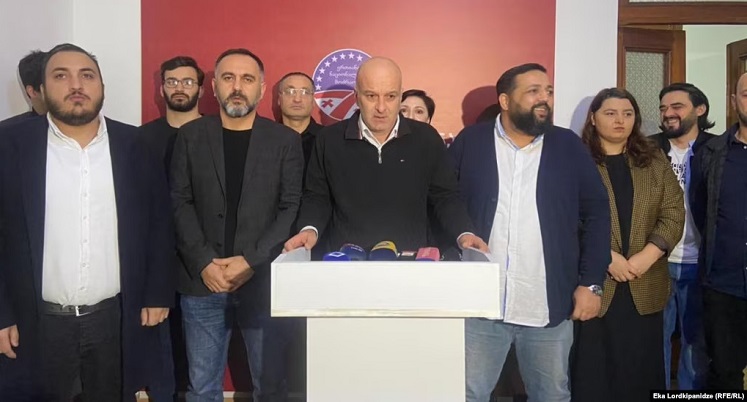UNM member exodus in Batumi as nine leave party amid controversy

Seven of 13 members in Batumi City Assembly left the party. Photo: RFE/RL
Nine members of the United National Movement opposition in the country’s western city of Batumi on Monday announced their exit from the faction, citing “irreconcilable differences” and an alleged lack of prospects for unity under the current management.
Speaking in a press briefing, departing members, including several Batumi City Assembly representatives, claimed they had exhausted “all chances of unity” and made the “difficult decision” after “careful consideration”, also confirming their previous communication with Nika Melia, the former Chair of the party.
Despite “concerted efforts” to maintain party cohesion, the members conveyed their disappointment, asserting that “no substantial changes” were expected within UNM until 2025, with the “crucial” 2024 parliamentary elections on the horizon.
Giorgi Kirtadze, now a former member of the party, however stressed “we remain faithful to the ideals of the [2003] Rose Revolution and continue to fight from a new platform”, adding the departing members would join a potential new group if one was founded by Melia.
The move comes after calls by six members of the party in Tbilisi City Assembly last week for termination of the position of the Chair of the group before next year’s elections and proposals for the establishment of a temporary governing body instead.
Their statement came after the party Chair Levan Khabeishvili decided to expand UNM’s Political Council with 20 new members earlier the same week - as offered by Mikheil Saakashvili, the imprisoned former President and UNM founder - amid calls for his resignation by the faction’s current and former members.
In their calls, the UNM members in the Assembly claimed the current party management had demonstrated a lack of focus on party unity and democratic political system since its election in January and February and accused it of fostering dissent within the party.
The controversy stems from the formation of the Political Council following the Chair’s election in late January, with the six members claiming the decision, coupled with actions and rhetoric of the management and Khabeishvili, had resulted in a “prolonged crisis”. The members asserted the crisis would persist and deepen if not resolved.
The statement also warned against the “misconception” that “expelling one individual, such as Melia, or a few others from the party” would only affect the members in question, with the statement claiming the move would leave “hundreds of party members and thousands of supporters” beyond the faction.
Khabeishvili last Monday signed a paper during live broadcasting while claiming Melia “no longer represents” the faction, but refrained from using the term “expulsion” in an ongoing controversy over the matter.
Khabeishvili, who has been accused by Melia of being a “puppet” of former UNM officials including Vano Merabishvili and David Kezerashvili, also said if the former Chair “changed his wording and stance” he could be accepted in the party again.
 Tweet
Tweet  Share
Share